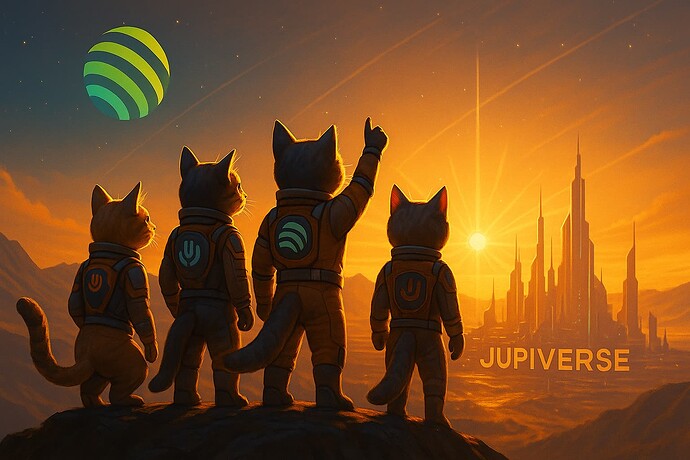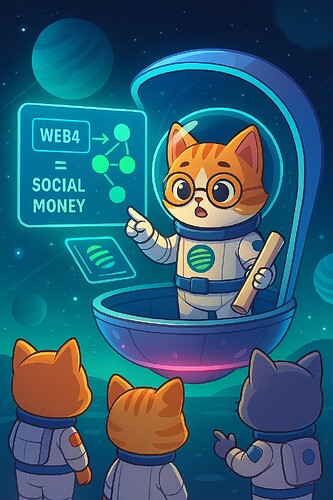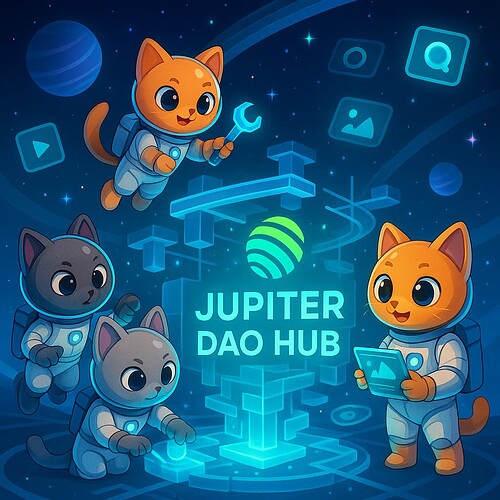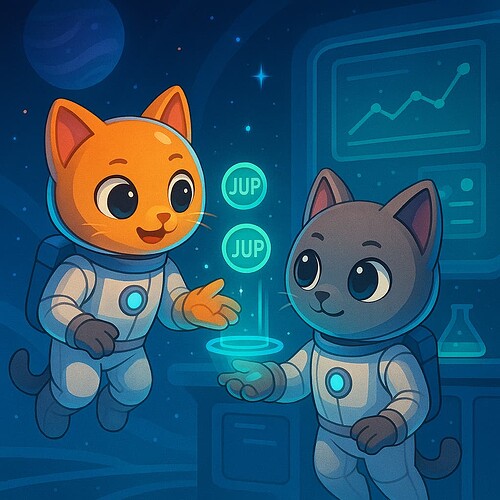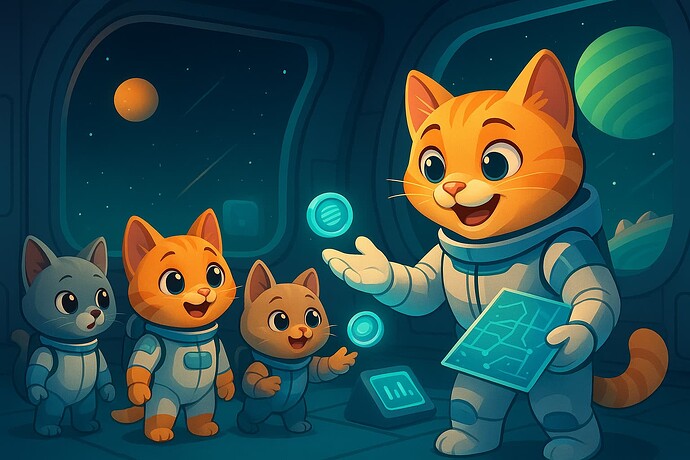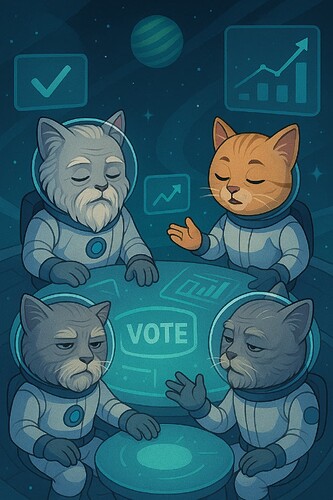Embracing Web4: A Community-Driven Future for Jupiter DAO
The Jupiter community finds itself at a crossroads. After an exciting period of rapid growth and product launches, it’s become clear that the true strength of our project lies in our community and how we use our token to empower that community – not just in the technology we build or the token’s market price. To unlock Jupiter’s full potential, we need to shift our approach: focusing on community-driven initiatives, new working groups, and funding operations that unify the “Jupiverse” and create real utility for the JUP token. This essay outlines a new direction for the DAO that emphasizes Web4’s social money vision, stronger community engagement, and practical steps to support our token through our own collective efforts. The goal is to convince both community members and the core team that this approach will drive lasting value for Jupiter and its people.
Processing: ChatGPT Image Jun 15, 2025, 02_18_21 PM.png…
The Web4 Vision: Social Money and Community Value
Jupiter’s co-founder Meow has articulated a vision of “Web4” as the era of social monies – where communities create and control currencies to reflect their shared values and enable new forms of cooperation. In this paradigm, a token like JUP isn’t meant to be a traditional value-accrual asset or a vehicle for speculation, but rather a tool for network alignment and social coordination. In other words, the purpose of our token is not to extract profit from the community, but to express our collective belief and to coordinate our actions.
Under the Web4 vision, JUP becomes a social currency of our community’s culture and goals. It should embody what Jupiter DAO stands for and incentivize participation in that vision. Communities in Web4 “will create currencies that directly embed their values, ideas, and objectives” – and Jupiter’s value comes from how well we embed our ideals of openness, innovation, and mutual support into JUP’s role in our ecosystem. This is a profound shift in approach: instead of asking “How can the community increase the token’s price?”, we ask “How can the token increase the community’s cohesion and impact?” By realigning with this purpose, we set the stage for new initiatives that use JUP in service of the community, which ultimately drives organic value back to the token as a byproduct of a thriving ecosystem.
From Scattered to Unified: Unifying the Jupiverse
One of the biggest challenges right now is that our community content and tools are scattered across the “Jupiverse.” Jupiter has built many great products and seen various grassroots projects emerge, but they often live in isolation. As a result, users – especially newcomers – struggle to get a clear picture of everything Jupiter has to offer and what’s going on in our DAO. Even our own team has noted this problem: Jupiter moves fast with new ideas and products, but “messaging often doesn’t keep up,” leading to a fragmented community experience where people struggle to stay aligned on what’s happening.
We have podcasts and videos here, a forum there, maybe an educational document somewhere else. All these pieces exist, yet there’s no single gateway for a curious person to explore the whole ecosystem. This fragmentation dilutes our community’s strength.
To fix this, we should create a unified community platform – a one-stop hub for the Jupiter ecosystem. Imagine a main DAO-driven website that aggregates all things Jupiter in one place. This platform would be built by the community, for the community, under the DAO’s guidance. It could include:
- A Comprehensive Directory: A structured directory of all Jupiter resources and projects – from the core exchange platform and mobile app to educational articles, how-to guides, community podcasts, videos, and developer tools. If it’s part of our ecosystem, it should be easily discoverable on this site. This ends the scavenger hunt across discord, forums, and X to find information.
- Community Content Sections: A place for community-generated content – think blogs or knowledge base articles written by members, artwork and memes celebrating our culture, tutorials and FAQs for newcomers, and even forums or Q&A sections. This empowers anyone in the DAO to contribute meaningful content and have it showcased prominently.
- Interactive Features: Live community calendars for events, an idea submission portal, and highlight reels of community achievements or proposals. New members could see at a glance what’s happening and how to get involved. Profiles or spotlights on contributors (as JUP & JUICE suggested, “showcasing DAO members” to make the DAO more human) can foster a sense of identity and pride.
Crucially, this unified platform would not just be an informational website – it would be the ecosystem’s own little economy. And that’s where the JUP token comes in.
Micropayments and Mutual Incentives: Using JUP in the Ecosystem
To truly embody the Web4 spirit, our community hub should integrate JUP-based micropayments as a core feature. This means community members can use small amounts of JUP to access content or services on the platform, and those contributions directly reward the creators and maintainers of that content. By doing this, we achieve two powerful outcomes: supporting our creators and creating real utility (and demand) for our token.
Thanks to blockchain technology, micropayments are now practical and increasingly common for online content. In 2025, many platforms allow users to “pay a few cents to read a single news article… [or] send small tips to creators when they enjoy a piece of content,” instead of relying on ads or pricy subscriptions. We can leverage this trend within Jupiter’s community. For example, accessing a premium in-depth research article or a high-effort tutorial video might cost a tiny fee – say, the equivalent of $0.10 in JUP. That’s a trivial amount for a user (far less than any monthly subscription), but with enough participants it becomes meaningful income for the content creator. It also gives immediate feedback and reward to creators: they know that even a niche piece that a few dozen people love will earn them something, which encourages quality and creativity over chasing clickbait. Importantly, this pay-as-you-go model doesn’t wall off information unjustly – prices would be low and adjustable, and basic community updates or documentation could remain free, while value-added or entertainment content carries a small cost. Everyone can still participate, but those who put extra effort into creating especially valuable content are directly rewarded by their peers.
The beauty of this system is how it aligns incentives across the board. Consider the flow of value: A community member pays a little JUP to access a piece of content they find interesting. That JUP is automatically split – a portion going to the content creator as a reward for their contribution, and perhaps a portion going into a DAO treasury or buyback program to support the token’s value on the market (for example, by periodically buying and burning JUP, or funding community grants). In this way, every transaction feeds back into Jupiter’s economy. Creators earn a passive income stream for as long as their content is useful, incentivizing them to keep producing great work. Users get a richer platform experience and can directly support what they enjoy without breaking the bank. And the token itself gains constant utility: people use JUP daily for something more than speculation, which creates organic demand. As a bonus, by routing a part of each micro-transaction to market buybacks, we create a gentle but continuous buy pressure on JUP – meaning the more the platform is used, the more value accrues to all token holders in the long run.
Other crypto communities have begun discovering that micropayments forge stronger creator-audience connections and healthier ecosystems. With crypto payment rails, there’s no high credit card fee to stop a $0.10 payment, no waiting for monthly payouts – it’s instant and global. Fans can support their favorite creator directly, and communities form around this model of mutual support. This is exactly the kind of self-sustaining loop we want for Jupiter: we, the community, take responsibility for our token’s value by using it among ourselves to uplift our content creators and builders. In doing so, we reduce reliance on external hype or external funding because we’re generating our own micro-economy. It’s the practical realization of the Web4 idea – our money (JUP) becomes a social instrument that rewards desired outcomes (more content, better engagement, aligned values).
Broadening Our Reach with Community Content
Another advantage of this community-centric platform is that it lets us broaden Jupiter’s appeal beyond the existing crypto crowd. Right now, much of the content created around Jupiter is likely focused on using the Jupiter exchange, DAO governance, or crypto market topics. While that’s important, our vision should expand to show that our community isn’t just about a trading platform – it’s about a culture and a movement. By encouraging diverse content, we can attract people who might not yet be crypto-savvy but are drawn to interesting and relatable material.
Imagine a section of the platform featuring lifestyle or creative content powered by our community: think fun challenges, crypto-infused memes and art contests, educational series that explain finance or technology in simple terms, or even charitable campaigns funded by JUP tokens. Such content could catch the eye of someone browsing the web, even if they aren’t a Jupiter user (yet). If they see an entertaining video or an insightful article that just costs a few cents worth of a token to unlock, they might dip their toes in – and that could be their gateway into our community. In this way, Jupiter’s ecosystem can showcase the value of a decentralized community to outsiders. We become an example of how a crypto community can create real content and tools that anyone can enjoy, not just endless discussions of token price or technical jargon. It shifts the narrative: from “crypto is just speculation” to “crypto enables communities to build cool, user-friendly experiences and support each other.”
This approach also highlights the human side of our DAO. When people outside see a thriving platform full of user-generated content, they see a living, breathing community – not just code, speculation in a casino and charts. This can build reputation and trust. Those who join purely for the content might stay for the deeper crypto journey once they realize there’s a welcoming community behind it. In the long run, growing our community in both crypto-native and non-crypto circles increases resilience. We’re not solely dependent on the typical crypto market cycles; we’ll have people involved because they find genuine social and creative value here.
Turning Vision into Action: New Working Groups and DAO Leadership
To make this vision a reality, the Jupiter DAO must take the lead. This means forming new working groups tasked with designing, building, and maintaining the community platform and its economy. Fortunately, we already have a governance structure and funding mechanism to support such initiatives – we just need to realign our priorities and resources towards this goal.
What might this involve? First and foremost, establish a “Community Platform” working group under the DAO. This group would be responsible for the project end-to-end. It should include a mix of talents: web developers and designers to build the site, content curators or community managers to organize and source material, and perhaps marketing or outreach folks to help drive engagement. The working group could start by auditing all existing Jupiter-related content and tools (official and community-made) to plan how best to integrate them. For example, they can pull in the content already produced by teams like JUP & JUICE (who created dozens of podcasts and videos) and ensure it’s neatly presented on the new site. They can also coordinate with other groups – if there’s a developer documentation portal or a knowledge base in progress, it should be part of this ecosystem rather than a separate island.
Funding for this effort should be proposed in the DAO. The working group will likely need a budget to hire professional web developers or compensate contributors who take on heavy workloads. This is a worthy investment: rather than funding yet another external partnership that might or might not benefit us, we’d be investing directly in our own infrastructure and community (a point even some community members have raised, advocating to reinvest in Jupiter’s own ecosystem rather than only external projects). A reasonable budget can be allocated for an initial build phase and then an ongoing maintenance phase. Remember, this platform is effectively the home of our social currency – it’s where JUP will live and breathe through daily use. It’s hard to think of a more impactful use of treasury funds than ensuring our currency has a vibrant home.
An important aspect is that this platform and its content should be run by the DAO, not a centralized team. The community should have input on features and the kind of content we want to highlight. Perhaps the working group can have an open channel or regular calls for anyone interested (including team members) to contribute ideas. We could even use governance votes for major decisions, like which big feature to prioritize next. This openness will keep with the spirit of decentralization and also spread the sense of ownership – when you use the platform, you know the community built it and you can shape it.
This WG team wouldn’t just write a website or moderate a chat. They’d:
- Design the systems that enable micro-contributions from our whole community.
- Define KPIs and task scopes for sub-projects.
- Allocate micro-budgets to community members or outside specialists.
- Manage product launches, content hubs, or incentive flows end to end.
Their job is to unlock work for others — not just to do it themselves.
Importantly, we can start by drawing from the Catdets and Cats of Culture — not to fund more content, but to organize and manage creative labor.
And over time, the DAO can vote in new leads, hold the team accountable, and evolve the scope.
It’s worth noting that we don’t have to invent everything from scratch. Many of the tools for micropayments, content hosting, and token-integration already exist or have precedent in the crypto space. For instance, decentralized content platforms and tipping systems on blockchain have been around; we can learn from their successes and pitfalls. We can integrate Jupiter’s existing products (for example, using Jupiter’s swap functionality within the site so a user can easily swap into JUP to pay for content, if they arrive with only SOL or USDC). We have the pieces – now we need the dedicated focus to put them together in a cohesive way.
A New Approach, Not a Finished Solution
The ideas laid out here represent a shift in approach for Jupiter DAO.
It’s important to understand this as an evolving strategy – we are not claiming to have a perfect, ready-made solution for guaranteeing JUP’s success. Instead, we’re proposing a philosophy and direction: one where community comes first and everything we do serves to strengthen that community and it’s token - JUP.
This approach asks the team and DAO to think a bit differently about spending and funding. Instead of asking “what is the ROI in dollar terms for this expenditure?”, we ask “what is the ROI in community growth and morale?” For example, funding a website or a content creator might not immediately 10x the treasury, but it can 10x the amount of activity and positivity in the community, which in turn creates the foundation for value.
By embracing this new direction, Jupiter DAO can become a pioneer in the Web4 era of social money. We have a chance to show how a crypto community can responsibly take its fate into its own hands – using its own token to empower its members, educate newcomers, and produce content and tools that matter. If we succeed, JUP won’t just be another token on the market; it will be the lifeblood of a vibrant online society. People holding JUP will do so not just in hopes of number-go-up, but because it gives them membership to a creative, supportive network and access to valuable experiences. That is the kind of intrinsic value that no market downturn can take away.
In conclusion, this is a call to re-focus and reorganize. Let’s form the working groups that will build our unified platform and implement the micropayment economy. Let’s fund our community builders and content creators, treating it as a core investment in Jupiter’s future. Let’s actively welcome not just crypto traders, but anyone who resonates with our content and values, into our ecosystem. And importantly, let’s do it in an open-ended, collaborative way – the specifics will evolve through experimentation and feedback. The key is embracing the mindset that Jupiter’s growth will come from within, from us – the DAO – nurturing our own “Jupiverse.” - not from the Team.
Examples of what we can build
 NFT Launch Hub
NFT Launch Hub
- Community-run NFT minting and collection platform. - let’s leverage Drip
- Mint, buy, and list NFTs in JUP.
- A cut of each transaction goes to Treasury.
- Could evolve into DAO-curated themed drops (e.g., memes, animations, protest art).
 JUP Skillshare (Education Platform)
JUP Skillshare (Education Platform)
- Paywalled video courses, AI tutorials, trading guides, etc.
- JUP used for tipping, subscriptions, or pay-per-lesson.
- Teachers earn JUP; DAO earns a percentage.
- Content could integrate AI copilots or JUPHorizon support.
 JUP Games & Puzzles
JUP Games & Puzzles
- Monthly ARGs, scavenger hunts, or market prediction quests.
- Entry and prizes in JUP.
- Could be community-built using open tooling and DAO narrative.
 JUP Grants Portal (“JupHelp”)
JUP Grants Portal (“JupHelp”)
- Apply for microgrants with clear JUP-aligned outcomes.
- Focus on shipping tools that increase JUP usage.
- Think: community Gitcoin with token-burn mechanics every few month.
 Creator Monetization Tools (Ko-fi/Patreon Alternative)
Creator Monetization Tools (Ko-fi/Patreon Alternative)
- JUP-native platform where creators get paid for: Early access, Exclusive posts, Commissioned work
- Split between creator & DAO.
 Micropaywall Infrastructure
Micropaywall Infrastructure
- DAO-developed widget that lets any content creator on the web gate access with a 10-cent JUP payment.
- Integrate with Solana wallets.
- Optional JUP burn per view - or JUP treasury send for more grants.
 Bounties & Gig Work Marketplace
Bounties & Gig Work Marketplace
- Like Fiverr but DAO-native.
- Community posts micro-bounties (translate this, design that).
- Workers build rep and earn JUP.
- Automate funding through WG budgets or grants.
 DAO Talent Directory (Find a Builder, Hire a JUPie)
DAO Talent Directory (Find a Builder, Hire a JUPie)
- Think LinkedIn x Upwork x Dework.- Profiles tagged by skill – JUP payment optional or required – Verified contributors ranked by reputation
 JUPHorizon 2.0
JUPHorizon 2.0
- AI assistant baked into all DAO platforms.
- Helps users:\n – Navigate bounties, gigs, grants\n – Submit proposals\n – Build pitch decks\n – Discover where they fit
 JUPStock: Media & Asset Library
JUPStock: Media & Asset Library
- Community uploads royalty-free photos, music, video, or design assets.
- JUP unlocks downloads.
- Contributor earns JUP, DAO takes a small fee.
 Quadratic Funding for DAO Initiatives
Quadratic Funding for DAO Initiatives
- Weekly or monthly round where community can allocate JUP to: – Tools – Public goods – Experiments
- JUP matching fund multiplies underdog support.
The DAO Needs To Be the Builder. Jupiter the Company Should Be the Shadow
One thing we want to be clear about: this isn’t about Jupiter the company building for us.
This is about us — the DAO — building for ourselves.
Jupiter meaning the TEAM should remain a shadow in this realm: always nearby, occasionally supportive, but never the lead actor. That’s how decentralization earns meaning.
We can’t keep running to the team for every initiative. We need our own engine. Our own platforms. Our own funding models.
And that means funding teams who build networks, not just individuals who chase grants.
If you’ve made it this far, thank you. That already says a lot about your care for this community and what we’re trying to build together.
Please, if this essay resonates with you — or even if it doesn’t — leave a real comment. Share your thoughts. Challenge the assumptions. Add your own ideas. Don’t just “like” and move on. Because silence is how even good ideas fade into nothing.
Share this with others on Discord. Bring it up in other threads. Invite your friends in the DAO to think about what a more self-directed, $JUP-powered future might look like.
We’re heading into a stretch of important proposals and votes. What we do now — what we say and what we build — will shape what gets funded, what gets built, and what kind of DAO we become.
